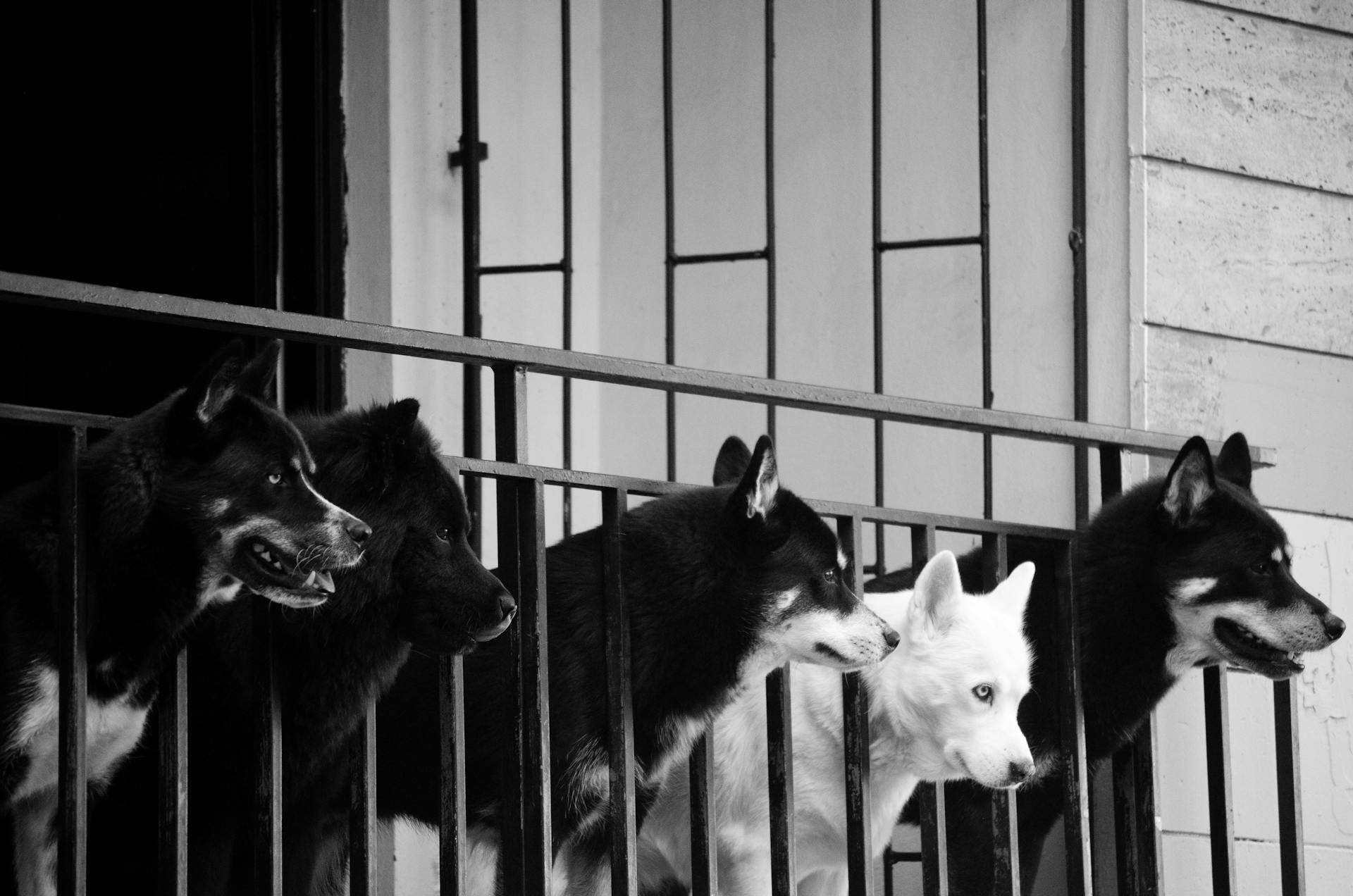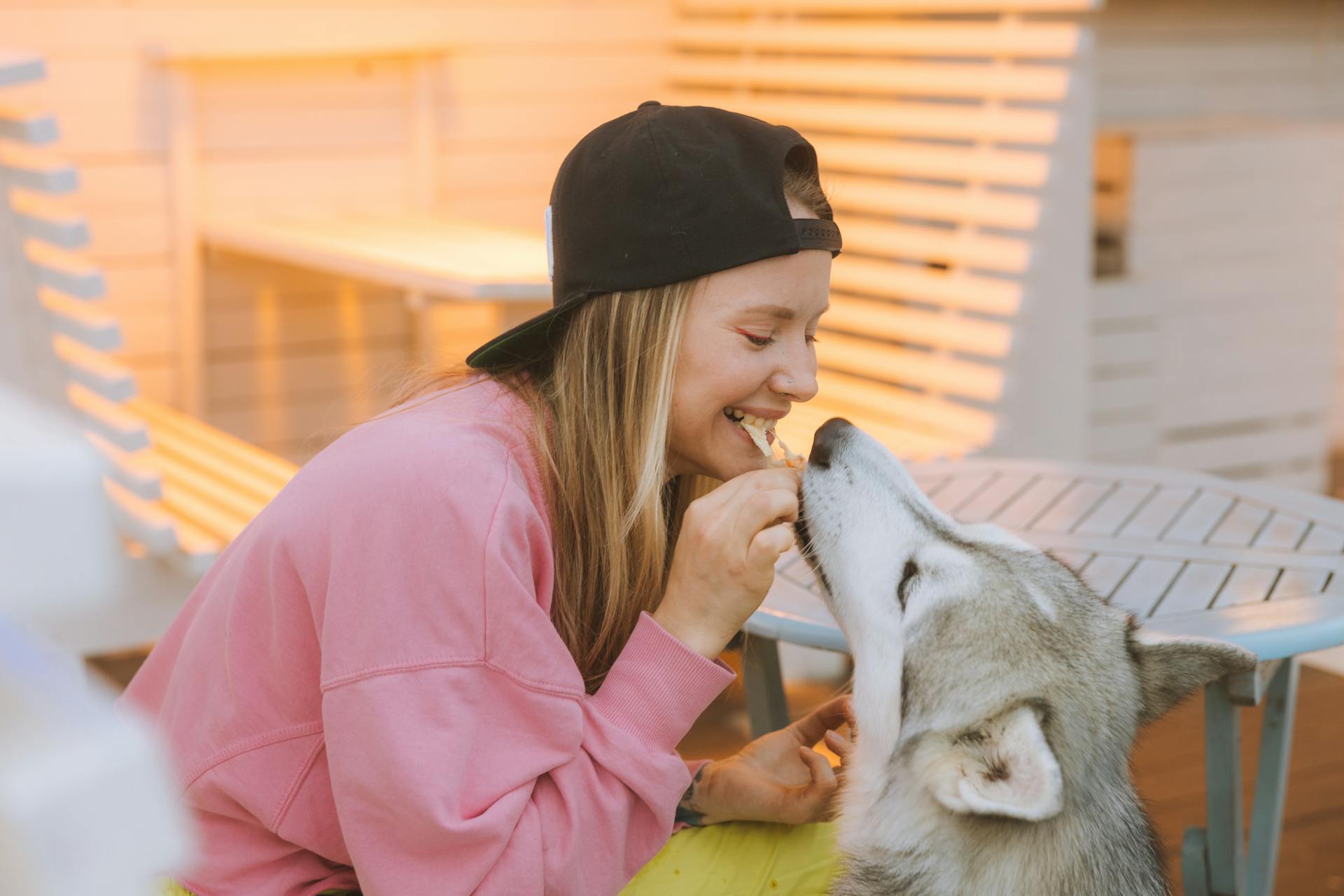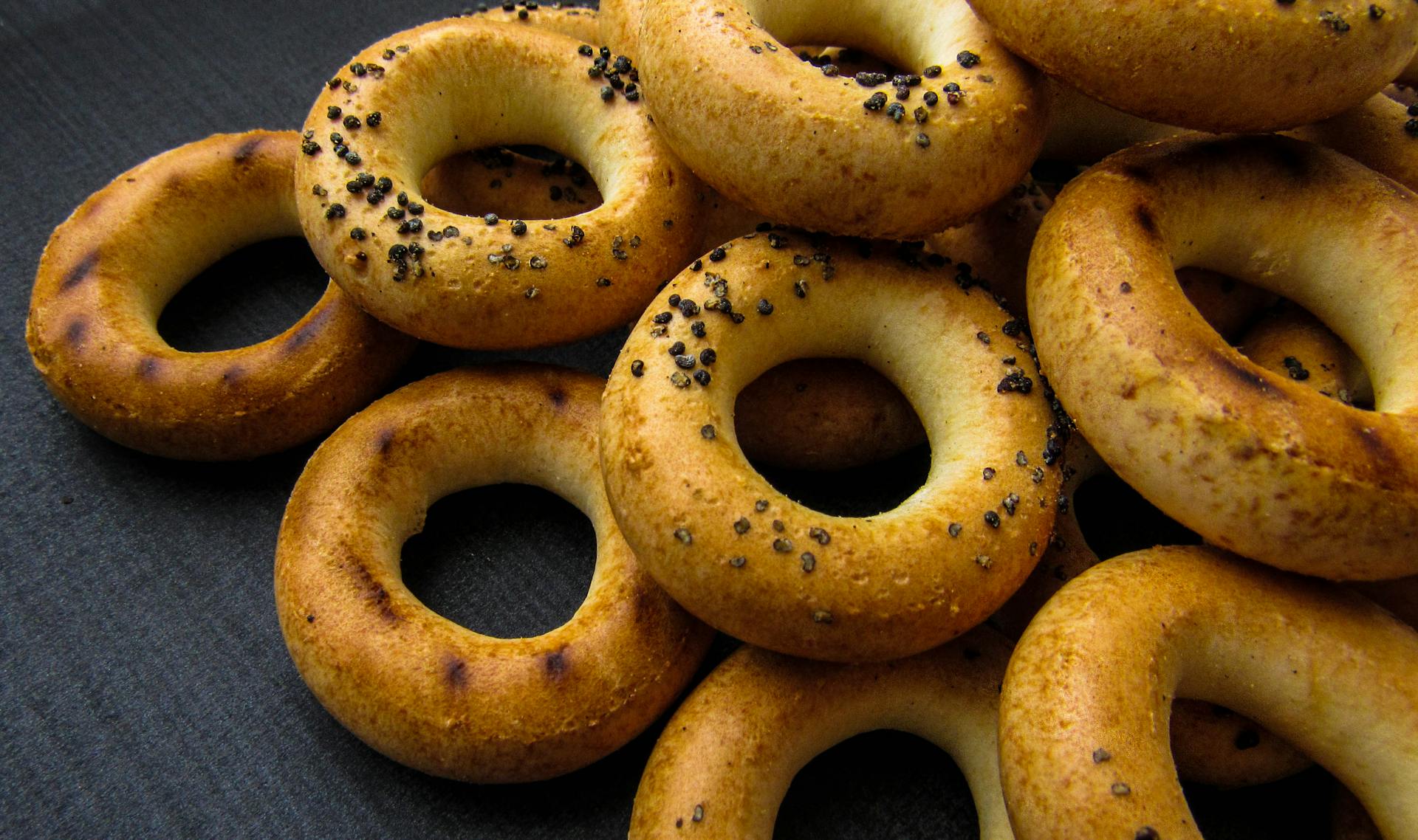
Eating poppy seeds can be a problem for dogs, and it's essential to know the risks and symptoms. Poppy seeds contain a substance called morphine, which can be toxic to dogs.
If your dog eats poppy seeds, they may experience symptoms like vomiting, diarrhea, and abdominal pain. These symptoms can start within 30 minutes to 2 hours after consumption.
The amount of poppy seeds that can cause harm varies depending on the size of your dog. Small dogs are more susceptible to the toxic effects of morphine due to their smaller body weight.
Here's an interesting read: Dogs Eating Pumpkin Seeds
What to Expect
If your dog eats poppy seeds, you'll want to know what to expect. The symptoms of poppy poisoning in dogs can vary depending on the amount ingested, but they can include loss of appetite, pinpoint pupils, trembling, ataxia, weakness, depression, sedation, respiratory depression, slowed heart rate, and even coma.
Some dogs may only experience mild symptoms, like lethargy or depression, while others may exhibit more severe reactions. If you notice any of these symptoms, it's essential to seek veterinary attention as soon as possible.
Recommended read: Poppy Seed Muffins
The amount of poppy seeds your dog consumes can affect the severity of the symptoms. Eating a small amount, like from a piece of bread or a bagel, is unlikely to cause harm, but it's still important to keep an eye on your dog for 24-48 hours. If you suspect your dog has eaten a large amount, such as an entire bag of poppy seeds, you should contact your vet immediately.
Here are some common symptoms to watch out for:
- Loss of appetite
- Pinpoint pupils
- Trembling
- Ataxia
- Weakness
- Depression
- Sedation
- Respiratory depression
- Slowed heart rate
- Coma
Keep in mind that the poppy plant is toxic to dogs, and even small amounts can cause harm. If you have poppy seeds at home, it's essential to keep them out of reach of your furry friends.
Causes and Risks
Poppy seeds contain 0.5-10 micrograms of morphine per gram, which can be toxic to dogs even in small amounts.
The poppy plant, including edible poppy seeds, is a member of the Papaver genus of plants, all of which are poisonous to dogs.
See what others are reading: Dogs Eating Apple Seeds
Ingesting poppy seeds can cause damage to a dog's central nervous system, leading to symptoms such as sedation or an excited state.
Commercially available poppy seeds are washed and processed, removing any trace of alkaloids, but unprocessed seeds may still contain codeine and morphine.
You would have to eat a large quantity of poppy seeds to feel any kind of drug high or narcotic effects, but dogs can be harmed by even small amounts.
A unique perspective: Dogs Eating Sunflower Seeds
The Cause of
The Cause of Poppy Seed Poisoning in Dogs is due to the toxic alkaloids present in the plant. These alkaloids can affect the central nervous system, causing sedation or an excited state.
Poppy seeds contain between 0.5 and 10 micrograms of morphine per gram, which is enough to cause harm in dogs. Eating just a small amount of poppy seeds can be toxic to dogs.
The Pet Poison Helpline notes that the alkaloids found in poppies can cause a range of symptoms in dogs, including vomiting, diarrhea, and even seizures.
Why They Are Bad

Poppy seeds contain morphine and codeine, two alkaloids that can be detrimental to a dog's nervous system.
These alkaloids are found in the poppy plant, which is a member of the Papaver genus of plants, all of which are poisonous to dogs.
To put it simply, dogs need to eat only a small amount of poppy seeds to experience negative effects.
Commercially available poppy seeds are washed and processed, removing any trace of these alkaloids, but unprocessed seeds may still contain them.
You'd be surprised to learn that even a small amount of poppy seeds can cause sedation or an excited state in dogs.
Poppies contain both morphine and codeine, which can affect a dog's central nervous system, leading to symptoms like vomiting, diarrhea, and lethargy.
The amount of morphine in poppy seeds can range from 0.5 to 10 micrograms per gram, which may not be a problem for humans but can be toxic for dogs.
Fortunately, your dog would need to eat a large quantity of poppy seeds before it becomes very dangerous, but it's still best not to feed them this ingredient.
Worth a look: My Dogs Not Eating
Signs of Toxicity

If your dog has eaten poppy seeds, it's essential to be aware of the signs of toxicity. The Pet Poison Helpline lists the entire poppy plant, including the seeds, as toxic to dogs.
Your dog may react differently to the toxins, depending on their size and breed. A small amount can cause a bigger reaction than you might expect.
Lack of appetite is one of the signs of toxicity in dogs. This can be a subtle symptom, so it's crucial to monitor your dog's eating habits closely.
Increased or decreased heart rate can also occur. This can be a sign of the toxins affecting your dog's cardiovascular system.
Breathing difficulties are another potential symptom. If you notice your dog is panting more than usual or seems to be struggling to breathe, seek veterinary attention immediately.
Pinpoint pupils are a common sign of poppy toxicity in dogs. This can be a concerning symptom, so if you notice this in your dog, seek help right away.
Broaden your view: Salt Water Toxicity in Dogs

Excessive whining can be a sign that your dog is uncomfortable or in pain. This can be a subtle symptom, so pay close attention to your dog's behavior.
Some dogs may become euphoric and excited, while others may become sedate and almost catatonic. These reactions can vary widely from dog to dog.
Here are some common signs of poppy toxicity in dogs:
- Lack of appetite
- Increased or decreased heart rate
- Breathing difficulties
- Pinpoint pupils
- Excessive whining
- More excitable or more sedate than usual
Veterinary Advice and Treatment
If your dog has eaten poppy seeds or you suspect they have, it's crucial to call your veterinarian right away. They will guide you on the best course of action and may request that you bring your dog to their clinic for a check-up.
Your veterinarian knows the proper care for your dog in this situation and will be able to give them the necessary fluids and medication to manage symptoms. They will also carefully monitor your dog's condition and watch for any signs of complications.
In some cases, your veterinarian may advise you to induce vomiting at home, but only if directed to do so. If your dog has eaten poppy seeds more than 90 minutes ago, it's best to wait for your veterinarian's guidance.
Recovery

Recovery is a crucial aspect of treating poppy poisoning in dogs. The amount of poppy ingested and the timeliness of veterinary care significantly impact the prognosis for a full recovery.
If your dog only chewed on the foliage or ingested a small amount, the prognosis for a full recovery is good. This is especially true if your dog received veterinary care promptly.
However, if your dog ingested a larger amount, the prognosis may be guarded to poor, even with timely veterinary care. This highlights the importance of swift action in such situations.
Once all laboratory work comes back normal, and your dog is acting like himself and has regained his appetite, he will be able to go home. This is a clear indication that your dog is on the road to recovery.
Prevention is indeed the best form of treatment, especially when it comes to avoiding poppy plants altogether. If you're out on a walk with your dog, steer clear of this plant if you come across it.
Veterinary Advice and Treatment
If your dog has eaten poppy seeds, it's essential to call your veterinarian right away. They will be able to give your dog the proper fluids and medication needed, while carefully watching their symptoms and state of wellbeing.
Don't try to induce vomiting at home, unless otherwise directed by your vet. Even if your dog ate the poppy seeds more than 90 minutes ago, your veterinarian knows the proper care for your dog in this situation.
If your dog has ingested enough poppyseed or poppies to cause harm, you will notice the following symptoms: loss of appetite, loss of co-ordination, narrowing of the pupils, shaking or trembling, weakness and lethargy, hypoventilation, slow heart beat, and coma.
Your veterinarian will be able to help your dog recover from poppy poisoning, which can be very dangerous. If your dog shows any of the symptoms listed above, please take them to your veterinarian as soon as possible.
Here is a list of symptoms to look out for:
- Loss of appetite
- Loss of co-ordination
- Narrowing of the pupils
- Shaking or trembling
- Weakness and lethargy
- Hypoventilation
- Slow heart beat
- Coma
In some cases, your dog may seem fine the next day after eating a large amount of poppy seeds, but it's still essential to keep a close eye on them and watch out for any signs of poppy poisoning.
Can Eat Bread
It's best to keep poppy seed bread away from your dog, as it could give them an upset stomach.
Even one slice of poppy seed bread might not cause harm, but it's better to err on the side of caution and keep it out of reach.
The sugar and carbs in baked goods like muffins can increase a dog's risk for obesity, making it a good idea to limit their access to treats like poppy seed muffins.
Eating too many poppy seed muffins could even lead to a toxic reaction in dogs, so it's best to keep them entirely out of reach.
A unique perspective: Dogs Eating Bird Seed
Featured Images: pexels.com


